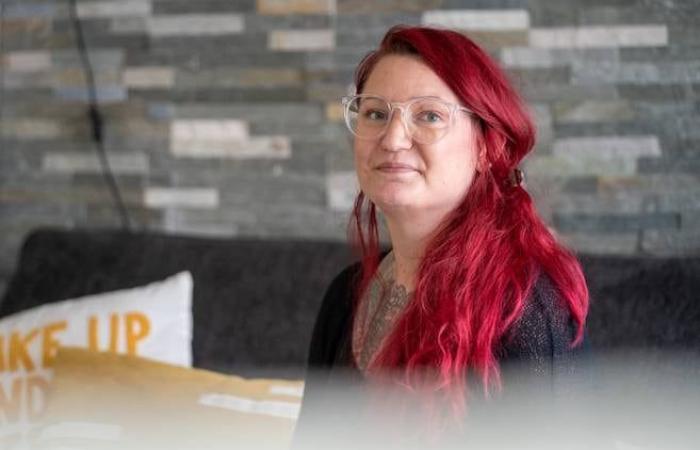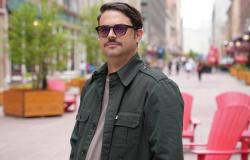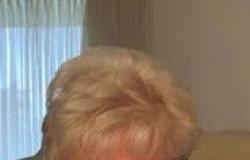Although we may talk about labor shortages and the difficulty of recruiting personnel to work in health care and with our seniors, it is clear that everything is not easy for those who raise their hands and decides to come and lend a hand.
It was thanks to international recruitment efforts that Margot Enderlin heard of, for the first time in her life, the Terrasses Dominicaines residence in Trois-Rivières. A private resource for seniors, certified by the CIUSSS Mauricie and Centre-du-Québec, which accommodates both independent clients and those losing their autonomy, in a specialized wing. It is in this wing that Margot would play her role as a clinical nurse, a profession for which she has been trained since 2014 in France.
“Since the age of eight, I have dreamed of coming to settle in Quebec. When I saw this opportunity, I said to myself that it was a wonderful opportunity. I really fell in love with this residence. It’s on a human scale, I love what I do, I love the people I work with. And I am so won over by the way we take care of the elderly. It’s completely in line with my values,” she notes.
It was through the Mutual Recognition Arrangement (ARM), an agreement concluded between Quebec and France, that she understood that her diploma would be recognized. The nursing profession does indeed appear in this document which summarizes this agreement concluded to remove obstacles to attracting workers.
The steps to bring her in were entirely undertaken by the private company which went to recruit her internationally. She was even provided with accommodation when she arrived, for her, her partner and their two children who were then aged 3 years and 14 months.
She subsequently paid more than $3,000 to be able to take the exam for the Order of Nurses of Quebec. However, this is where things got tricky.
In fact, to obtain recognition of her acquired skills, the CIUSSS-MCQ requires that she complete a 70-day advanced training course, which she is entirely willing to do. However, this internship must also be accompanied by a period of two years that she must devote to serving the public system. Even if all recruitment procedures were carried out by the Terrasses Dominicaines residence.
Margot Enderlin would really like her professional achievements as a nurse to be recognized in Quebec. (Stéphane Lessard/Le Nouvelliste)
“I agree to take the OIIQ exam, even if technically, with the agreement of the ARM it should be recognized that my diploma is equivalent to the Quebec diploma. But it feels like it’s a problem because I don’t go the traditional route. It’s as if this path was created and implemented solely to serve the public sector,” she denounces.
Aware of all the efforts made by her current employer to bring her here, Margot deplores that the situation is “unfair” for this residence, which would also be deprived of her presence for more than two years, after having taken so many steps and committed so many resources to recruit her.
His dearest wish? Be exempt from this obligation to work for two years in the public sector.
“It’s this residence that came to get me, and it’s for this residence that I want to work. The people there need me just as much.”
— Margot Enderlin
While waiting for the situation to resolve itself, Margot was able to take the exam for the Order of Auxiliary Nurses, which she passed. Since her arrival at Les Terrasses Dominicaines, she has worked as an auxiliary nurse, which still allows her to take care of the elderly, but which does not correspond to the range of professional actions she could perform. Which also doesn’t match why she was recruited in the first place.
And yet, her presence at the Dominican Terraces and the care she would be able to provide there with recognition of her acquired skills would certainly make it possible to avoid numerous transfers of patients to the emergency room when necessary.
“My presence there as a clinical nurse would avoid bogging down the public system. The finding just isn’t logical.”
— Margot Enderlin
This adds, for her and her partner, to rather cumbersome procedures for the immigration process, which does not go without discouraging them further. To date, she estimates that the steps taken have cost more than $10,000, without any results having yet been achieved.
First, their Quebec selection certificate was refused, since one of the required documents was submitted 48 hours late… This document attested that they understood and shared the democratic values of Quebec. “We are French! We share the same system of democratic values, we have the same social values. Okay, the paper arrived two days late, but does that justify refusing everything,” she wonders.
They therefore started the process again to obtain the Quebec Selection Certificate, a process which again cost them $2,000 and which will take several more months.
For the moment, his work permit has been renewed for the next three years, which secures his right to work here. However, she is impatient to see the moment when her situation, as well as that of her partner and children, will be regularized so that they can finally live the dream they had.
“As temporary residents, we have the same duties as other citizens, but not the same rights. My partner and I both work and pay taxes here. We are assets to society. But, for example, for my daughter’s daycare, we are not entitled to the withholding tax return. We have to bear the costs all year before receiving the return. With temporary status, there is no bank that will agree to lend you money to buy a house or a car. It gets complicated for a lot of things,” she summarizes.
When contacted by The Nouvelliste to obtain explanations, the CIUSSS declared that it would meet with the nurse in the coming days to reassess the file.
“The reported situation has a lot of variables. In this context, we will contact this nurse in the coming days in order to reassess her situation and analyze the options available to her,” I was told.
The CIUSSS-MCQ specifies that “when recruitment abroad is carried out by our establishment, we respect the guidelines included in the Recruitment process for health and social services professionals graduated from outside Canada”.
“In 2023, there are 13 nurses eligible for the Mutual Recognition Arrangement (ARM) of professional qualifications who completed their adaptation internship in our establishment and who signed a 36-month recruitment agreement with us », Adds the establishment.






